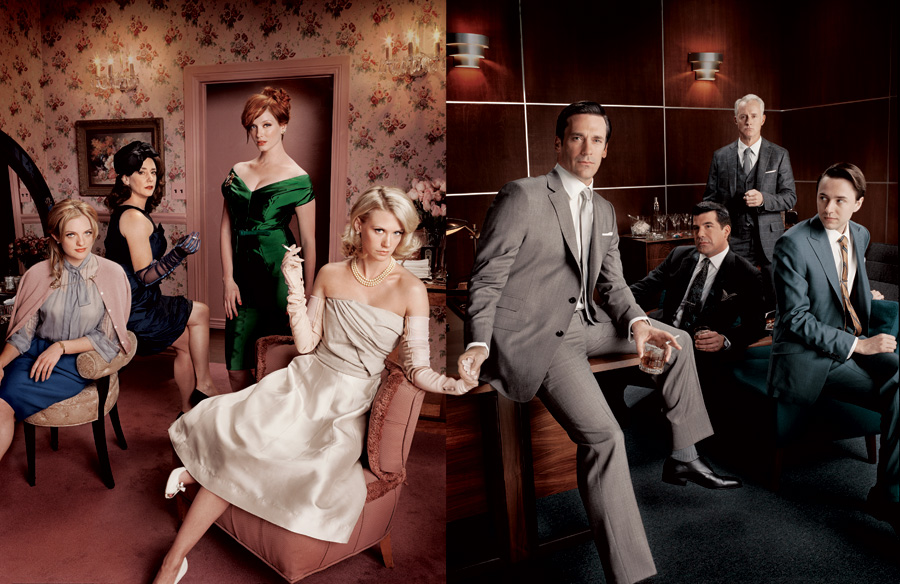Mad Men is our show at the moment. We're only on series three but flying through it. It's early 1960s Manhattan and the Mad Men are the advertising executives of Madison Avenue. The word 'Men' refers to just that. In this industry, the males get the office, the big salary and the prestige. The women work as secretaries and try to pick up husbands. The one girl who breaks through struggles to be treated on equal terms.
It's not just a man's world but a white man's world. The African-Americans have to content themselves with operating the lift. The series touches on the struggles in the South, but this is just another unfairness you have to accept in the show.
Much of the show trades on the discomfort the viewer feels in the inequalities of the day and in the smugness in just how far we have come. There are many ways in which the world has improved and in which we can be proud. However, I think it pays to be reminded that we're only part way down the road with regards to many of the issues portrayed.
Gender inequality.
Yes, women can now get top jobs but it's still no level playing field. Australian women earn 18.2% less than their male counterparts. Less than a third of Northern Ireland's top jobs are held by women. This Guardian article shows some of the progress made but also the challenges remaining.
We should be increasing childcare provisions for working mums and eliminating pay gaps. Organisations should be working to improve access to top jobs. This has to start in parliament.
The darker side of male and female workplace inequality rears it's head in the show, with sexual harassment rife. There's also really disturbing scene of rape within a relationship. It would be great to say that thankfully this doesn't happen any more but I can't.
Smoking
There is a LOT of smoking in Mad Men. In the office, in the car, around the kids. I'm glad that we see less of it on TV now. This is a period piece, but I'm not convinced that that justifies it. Smoking rates have come down since the sixties and legislation such as banning smoking in enclosed public places and in cars carrying children should be celebrated. The Mad Men have a tobacco account and are struggling to cope with the negative publicity surrounding links with cancer and heart disease.
I remember tobacco advertising and sponsorship in the UK. Good riddance. The tobacco companies are fighting back though. They are challenging plain packaging laws and moaning about hiding cigs in supermarkets. They are buying up e-cigarette companies and marketing them to young people. My co-podcaster Dave doesn't mind this but I do not want people to remain addicted to nicotine, or to start smoking as young people. All the while the companies are promoting cigarettes in developing countries and there are now more than 300 million smokers in China.
Alcohol
There's almost as much boozing as smoking. Every time someone walks into another office, they get a drink poured. After work drinks lead to accidents (and affairs) and drink driving is the norm. The show is also a vehicle for product placement. Them talking about how to advertise a particular product on the show IS advertising that product, obviously.
The costs of alcohol to the NHS alone run into the billions. Advertising definitely plays a part but price is likely to be a bigger factor in determining consumption. The government caved into pressure from the alcohol industry and backed down on minimum unit pricing.
We have not made the same leaps forward on alcohol that we have on smoking.
In The End
It's good to think that some things have got better. Mad Men is set before car seat-belts were compulsory. Now we wouldn't think of getting in a car without them. There are no actual tobacco adverts on British TV anymore. But there is still big money to be made in advertising, because it works. It might be cigarettes in China, e-cigarettes on our TV, junk food with kids toys, Coke pretending to care about health, the excitement of gambling or winning in an online casino or lager companies sponsoring major sporting events. We can look back at the sixties and be glad that things have moved on. In many ways, however, the adverts are just more clever and the Mad Men are still one step ahead.



Interestingly banning advertising on tobacco did not initially hurt the industry. The consumer base didn't diminish and the companies pocketed the cash they were having to spend outdoing each other with advertising campaigns. I don't know if this has remained the case.
ReplyDeleteIt was an established market and customers were loyal to a particular brand. Any one particular method will struggle to work on its own. When there is a reduction, it's often difficult to tease out the contribution of the differing policies. We know that price interventions tend to be most effective but legislation to limit promotion and restrictions on place of consumption do work and are more effective in conjunction, as part of a coordinated effort.
ReplyDelete